areportonamusingourselvestodeath娱乐至死英文读书报告
《娱乐至死》英文摘抄
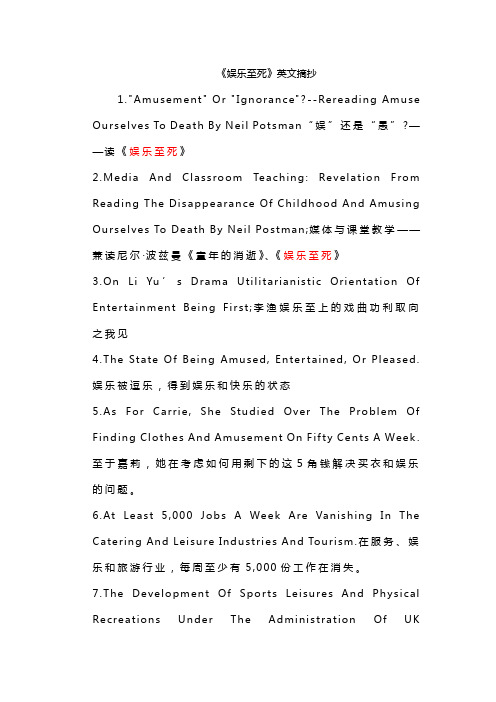
《娱乐至死》英文摘抄1."Am u se m e n t" O r "I gn o r an ce"?--Re re a di n g Am u se O u r s e l ve s To De at h B y N e i l Po t sm a n“娱”还是“愚”?——读《娱乐至死》2.M e di a An d C l a s s ro o m Te a ch i n g: Re ve l a ti o n F ro m Re adi n g Th e Di s ap pe ar an ce O f Ch i l dh o o d A n d Am u si n g O u r s e l ve s To De at h B y Ne i l Po st m a n;媒体与课堂教学——兼读尼尔·波兹曼《童年的消逝》、《娱乐至死》3.On Li Yu’s D r am a U ti l i t a ri an i s ti c O ri e n t a ti o n OfE n te r t ai n m e n t B e i n g Fi r s t;李渔娱乐至上的戏曲功利取向之我见4.Th e St a te Of B e i n g Am u se d, E n te r t ai n e d, O r Pl e a s e d.娱乐被逗乐,得到娱乐和快乐的状态5.As Fo r C ar ri e, S h e Stu di e d Ove r Th e Pro b l e m OfF i n di n g Cl o th e s A n d Am u se m e n t O n F i f t y Ce n t s A We e k.至于嘉莉,她在考虑如何用剩下的这5角钱解决买衣和娱乐的问题。
6.At Le as t 5,000J o b s A We e k A re Va n i s h i n g In Th eC a te ri n g An d Le i s u re In du s t ri e s An d To u r i s m.在服务、娱乐和旅游行业,每周至少有5,000份工作在消失。
老师读书心得 《娱乐至死》读书笔记
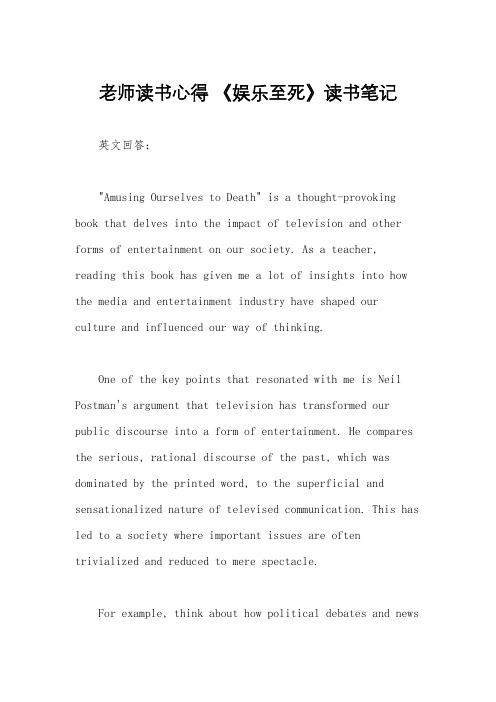
老师读书心得《娱乐至死》读书笔记英文回答:"Amusing Ourselves to Death" is a thought-provoking book that delves into the impact of television and other forms of entertainment on our society. As a teacher, reading this book has given me a lot of insights into how the media and entertainment industry have shaped ourculture and influenced our way of thinking.One of the key points that resonated with me is Neil Postman's argument that television has transformed our public discourse into a form of entertainment. He compares the serious, rational discourse of the past, which was dominated by the printed word, to the superficial and sensationalized nature of televised communication. This has led to a society where important issues are oftentrivialized and reduced to mere spectacle.For example, think about how political debates and newsprograms are often more focused on entertainment value and ratings rather than meaningful discussions about policies and ideas. This has had a profound impact on how we engage with the world around us, as we have become accustomed to seeking instant gratification and entertainment in all aspects of our lives.Another concept that struck a chord with me is the idea that our reliance on visual media has led to a decline in our ability to engage in critical thinking and sustained argument. Postman argues that the medium of television, with its emphasis on visual imagery and short attention spans, has eroded our capacity for deep, analytical thinking. Instead, we have become passive consumers of information, accepting whatever is presented to us without questioning or analyzing it.I see this in my own students, who often struggle to engage with complex texts and ideas because they are so used to consuming bite-sized, visually stimulating content. They are more interested in quick, entertaining videos than in-depth articles or books. This has made me realize theimportance of teaching them how to critically analyze and evaluate information, and to encourage them to seek out substantive, thought-provoking material.Overall, "Amusing Ourselves to Death" has been a powerful reminder of the profound impact that media and entertainment have on our society. It has made me more conscious of the need to cultivate critical thinking skills in my students and to encourage them to look beyond the surface of things.中文回答:《娱乐至死》是一本发人深省的书,深入探讨了电视和其他形式的娱乐对我们社会的影响。
娱乐至死作文八百字

娱乐至死作文八百字英文回答:Entertainment as a Distraction.In "Amusing Ourselves to Death," Neil Postman argues that our society has become obsessed with entertainment to the point where it has become a distraction from important issues. He believes that the rise of television as a medium has led to a decline in critical thinking and a loss of meaningful discourse.Postman's argument resonates with me because I have observed how entertainment has become a dominant force in our lives. We are constantly bombarded with entertainment in various forms, from television shows and movies tosocial media and video games. This constant stream of amusement has made it difficult for us to engage in deeper discussions and reflect on important matters.Television, in particular, has played a significantrole in shaping our culture. It presents information and news in a way that is easily digestible and entertaining, but often lacks depth and substance. As a result, we have become passive consumers of information, accepting whatever is presented to us without questioning or critically analyzing it.Moreover, the rise of reality television and celebrity culture has further contributed to the decline of meaningful discourse. We are more interested in the personal lives of celebrities and fictional stories than in discussing pressing social, political, and environmental issues. This focus on entertainment has led to a shallow and superficial society, where trivial matters take precedence over important ones.中文回答:《娱乐至死》中的娱乐作为一种分散注意力的方式。
amusing ourselves to death摘抄
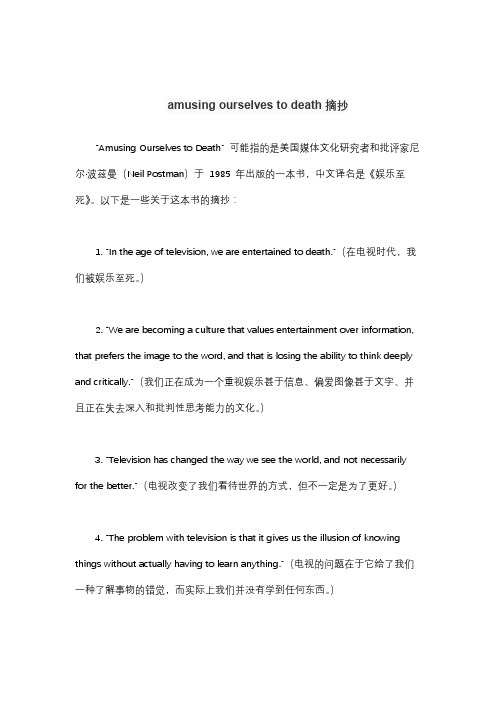
amusing ourselves to death摘抄“Amusing Ourselves to Death” 可能指的是美国媒体文化研究者和批评家尼尔·波兹曼(Neil Postman)于 1985 年出版的一本书,中文译名是《娱乐至死》。
以下是一些关于这本书的摘抄:1. “In the age of television, we are entertained to death.”(在电视时代,我们被娱乐至死。
)2. “We are becoming a culture that values entertainment over information, that prefers the image to the word, and that is losing the ability to think deeply and critically.”(我们正在成为一个重视娱乐甚于信息、偏爱图像甚于文字、并且正在失去深入和批判性思考能力的文化。
)3. “Television has changed the way we see the world, and not necessarily for the better.”(电视改变了我们看待世界的方式,但不一定是为了更好。
)4. “The problem with television is that it gives us the illusion of knowing things without actually having to learn anything.”(电视的问题在于它给了我们一种了解事物的错觉,而实际上我们并没有学到任何东西。
)5. “In a world of entertainment, everything is reduced to spectacle and we lose touch with the deeper meaning and value of life.”(在一个娱乐的世界里,一切都被简化为奇观,我们失去了与生活更深层次的意义和价值的联系。
对娱乐至死的态度英语作文
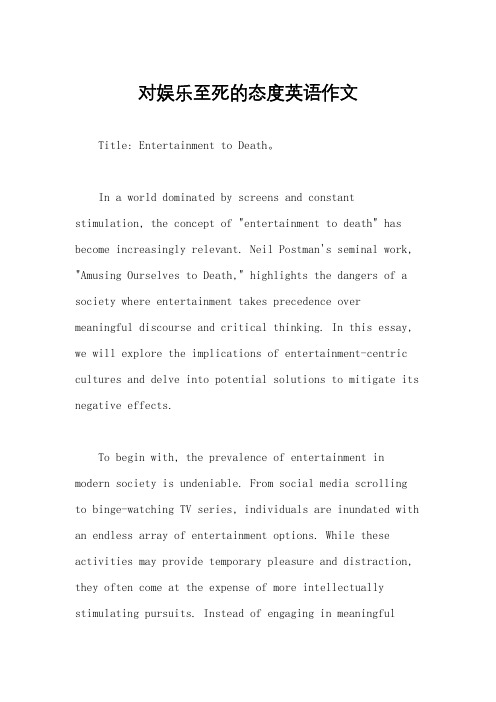
对娱乐至死的态度英语作文Title: Entertainment to Death。
In a world dominated by screens and constant stimulation, the concept of "entertainment to death" has become increasingly relevant. Neil Postman's seminal work, "Amusing Ourselves to Death," highlights the dangers of a society where entertainment takes precedence over meaningful discourse and critical thinking. In this essay, we will explore the implications of entertainment-centric cultures and delve into potential solutions to mitigate its negative effects.To begin with, the prevalence of entertainment in modern society is undeniable. From social media scrolling to binge-watching TV series, individuals are inundated with an endless array of entertainment options. While these activities may provide temporary pleasure and distraction, they often come at the expense of more intellectually stimulating pursuits. Instead of engaging in meaningfulconversations or deep reflection, many people opt for passive consumption of content that requires little to no critical thought.Moreover, the rise of entertainment-centric cultures has led to a decline in attention spans and an erosion of critical thinking skills. With the constant barrage of information and entertainment vying for our attention, it has become increasingly difficult to focus on complex issues or engage in nuanced discussions. Instead, society gravitates towards sensationalism and soundbites, favoring entertainment value over substance. This trend is particularly evident in the realm of politics and news media, where sensationalized headlines and clickbait articles dominate the landscape.Furthermore, the commodification of entertainment has led to the prioritization of profit over public good. In pursuit of ratings and advertising revenue, media companies often prioritize sensationalism and spectacle over journalistic integrity and truth. This has resulted in a proliferation of fake news and misinformation, furthereroding trust in traditional media sources. Additionally, the relentless pursuit of profit has fueled an arms racefor attention, with platforms competing to capture and retain users' engagement at any cost.However, all hope is not lost. There are steps that individuals and society as a whole can take to combat the pernicious effects of entertainment-centric cultures. Firstly, we must cultivate a culture of critical thinking and media literacy. By teaching individuals to critically evaluate the information they consume and discern fact from fiction, we can empower them to make informed decisions and resist manipulation by media outlets.Secondly, we must prioritize quality over quantity in our media consumption habits. Instead of mindlessly consuming endless streams of content, we should seek out meaningful and enriching experiences that challenge us intellectually and emotionally. This could involve reading thought-provoking books, engaging in stimulating conversations, or pursuing creative hobbies that stimulate our minds and ignite our passions.Thirdly, we must hold media companies accountable for their role in perpetuating entertainment-centric cultures. This requires demanding greater transparency and accountability from media outlets, as well as supporting independent journalism that prioritizes truth and integrity over sensationalism and profit. Additionally, regulatory measures may be necessary to curb the spread of fake news and misinformation and ensure that media companies act in the public interest.In conclusion, the phenomenon of "entertainment to death" poses significant challenges to individuals and society as a whole. However, by fostering a culture of critical thinking, prioritizing quality over quantity in our media consumption habits, and holding media companies accountable for their actions, we can mitigate its negative effects and build a more informed and engaged society. Ultimately, the choice lies with us – will we continue to amuse ourselves to death, or will we rise to the challenge and reclaim control of our minds and our future?。
amusing ourselves to death英文摘录
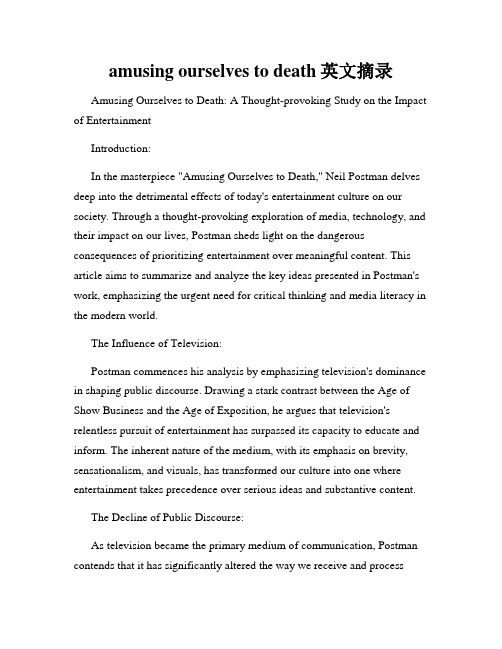
amusing ourselves to death英文摘录Amusing Ourselves to Death: A Thought-provoking Study on the Impact of EntertainmentIntroduction:In the masterpiece "Amusing Ourselves to Death," Neil Postman delves deep into the detrimental effects of today's entertainment culture on our society. Through a thought-provoking exploration of media, technology, and their impact on our lives, Postman sheds light on the dangerous consequences of prioritizing entertainment over meaningful content. This article aims to summarize and analyze the key ideas presented in Postman's work, emphasizing the urgent need for critical thinking and media literacy in the modern world.The Influence of Television:Postman commences his analysis by emphasizing television's dominance in shaping public discourse. Drawing a stark contrast between the Age of Show Business and the Age of Exposition, he argues that television's relentless pursuit of entertainment has surpassed its capacity to educate and inform. The inherent nature of the medium, with its emphasis on brevity, sensationalism, and visuals, has transformed our culture into one where entertainment takes precedence over serious ideas and substantive content.The Decline of Public Discourse:As television became the primary medium of communication, Postman contends that it has significantly altered the way we receive and processinformation. He asserts that television promotes a form of communication that is fragmented, shallow, and lacking in nuance. In the pursuit of ratings and viewer engagement, important issues are reduced to mere sound bites, trivializing complex topics and hindering meaningful public discourse. Consequently, critical thinking and intelligent discussion have been overshadowed by simplistic entertainment.News as Entertainment:Postman proceeds to critique the transformation of news into a form of entertainment. The merging of news and show business has led to the rise of infotainment, blurring the line between facts and sensationalism. News, once a platform to inform and enlighten individuals, has devolved into a source of amusement. The increasing reliance on visuals, flashy graphics, and captivating headlines reduces news to a spectacle, captivating viewers but failing to provide them with substantial, nuanced information.Implications on Politics and Education:Building upon his critique of television's influence, Postman highlights the profound implications on politics and education. In an entertainment-driven culture, political campaigns have become spectacles, emphasizing image, charisma, and entertainment value over substance and policy. The rise of television-centered politics diminishes the capacity for rational discourse, leaving citizens uninformed and ill-equipped to make informed decisions.Similarly, in the realm of education, the increasing influence of entertainment hinders the development of critical thinking. Postman argues that television's engaging and visually stimulating nature has conditionedindividuals to expect constant entertainment, making it challenging for educational institutions to foster deep, intellectual engagement. This shift jeopardizes the future by producing generations more interested in being entertained than educated.Strategies for Change:Recognizing the alarming consequences of an entertainment-driven society, Postman highlights the urgency to develop media literacy and critical thinking skills. By actively consuming media with a discerning eye, individuals can resist being passively manipulated by the culture of entertainment. Engaging in deep reading, intellectual discussions, and reflective thinking can cultivate the discernment necessary to resist the allure of mindless amusement.Postman concludes by urging society to reevaluate its obsession with entertainment and prioritize meaningful engagement with ideas and critical discourse. Only through conscious efforts to elevate important topics and restore intellectual rigor can we overcome the perils outlined in "Amusing Ourselves to Death" and build a society capable of true understanding and progress.Conclusion:In "Amusing Ourselves to Death," Neil Postman skillfully unveils the detrimental effects of an entertainment-focused culture on our society. By illuminating the pervasive influence of television, the decline of public discourse, the transformation of news, and the implications on politics and education, Postman presents a compelling case for the need to prioritize critical thinking and media literacy. This thought-provoking work serves as acall to action, urging us to reclaim our agency as consumers of media and actively engage in meaningful discourse that transcends the spectacle of entertainment. Only then can we amend the course and create a society that values intellectual growth, understanding, and progress.。
中传MFA考研考点:娱乐至死、泛娱乐化
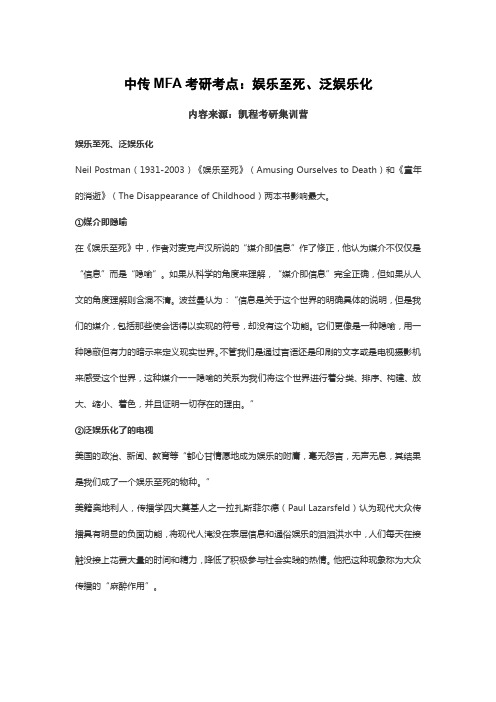
中传MFA考研考点:娱乐至死、泛娱乐化
内容来源:凯程考研集训营
娱乐至死、泛娱乐化
Neil Postman(1931-2003)《娱乐至死》(Amusing Ourselves to Death)和《童年的消逝》(The Disappearance of Childhood)两本书影响最大。
①媒介即隐喻
在《娱乐至死》中,作者对麦克卢汉所说的“媒介即信息”作了修正,他认为媒介不仅仅是“信息”而是“隐喻”。
如果从科学的角度来理解,“媒介即信息”完全正确,但如果从人文的角度理解则含混不清。
波兹曼认为:“信息是关于这个世界的明确具体的说明,但是我们的媒介,包括那些使会话得以实现的符号,却没有这个功能。
它们更像是一种隐喻,用一种隐蔽但有力的暗示来定义现实世界。
不管我们是通过言语还是印刷的文字或是电视摄影机来感受这个世界,这种媒介一一隐喻的关系为我们将这个世界进行着分类、排序、构建、放大、缩小、着色,并且证明一切存在的理由。
”
②泛娱乐化了的电视
美国的政治、新闻、教育等“都心甘情愿地成为娱乐的附庸,毫无怨言,无声无息,其结果是我们成了一个娱乐至死的物种。
”
美籍奥地利人,传播学四大奠基人之一拉扎斯菲尔德(Paul Lazarsfeld)认为现代大众传播具有明显的负面功能,将现代人淹没在表层信息和通俗娱乐的滔滔洪水中,人们每天在接触没接上花费大量的时间和精力,降低了积极参与社会实践的热情。
他把这种现象称为大众传播的“麻醉作用”。
娱乐至死作文八百字
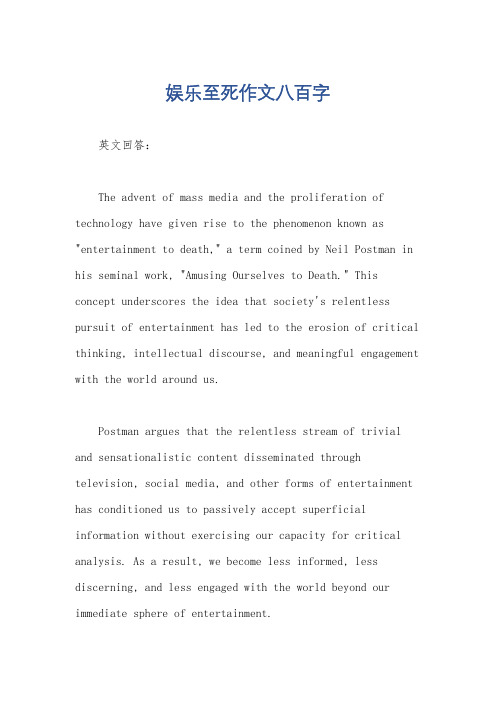
娱乐至死作文八百字英文回答:The advent of mass media and the proliferation of technology have given rise to the phenomenon known as "entertainment to death," a term coined by Neil Postman in his seminal work, "Amusing Ourselves to Death." This concept underscores the idea that society's relentless pursuit of entertainment has led to the erosion of critical thinking, intellectual discourse, and meaningful engagement with the world around us.Postman argues that the relentless stream of trivial and sensationalistic content disseminated through television, social media, and other forms of entertainment has conditioned us to passively accept superficial information without exercising our capacity for critical analysis. As a result, we become less informed, less discerning, and less engaged with the world beyond our immediate sphere of entertainment.Moreover, the blurring of lines between news and entertainment has further exacerbated this issue. News outlets, in an attempt to attract viewers and generate revenue, have increasingly adopted sensationalistic tactics and entertainment-like formats, sacrificing accuracy and depth for ratings and shareability. This has created an environment where it becomes increasingly difficult for individuals to distinguish between credible information and mere entertainment, further undermining their ability to make informed decisions.Furthermore, the proliferation of instant gratification and the demand for constant distraction have stifled our attention spans and diminished our capacity for sustained contemplation. We are bombarded with an endless array of stimuli, each designed to capture our attention for as long as possible. This constant bombardment of distractions erodes our ability to focus on complex issues, engage in meaningful conversations, and develop our intellectual capacities.As a result of these factors, society is becoming increasingly passive, apathetic, and disconnected from the larger world. We are lulled into a state of constant entertainment, where critical thinking, intellectual curiosity, and informed decision-making take a backseat to the pursuit of instant gratification and mindless consumption.中文回答:娱乐至死。
- 1、下载文档前请自行甄别文档内容的完整性,平台不提供额外的编辑、内容补充、找答案等附加服务。
- 2、"仅部分预览"的文档,不可在线预览部分如存在完整性等问题,可反馈申请退款(可完整预览的文档不适用该条件!)。
- 3、如文档侵犯您的权益,请联系客服反馈,我们会尽快为您处理(人工客服工作时间:9:00-18:30)。
Introduction: In recent years, ” Amusing ourselves to death” seem s to turn to a given phrase, shouldering the task of catching the eyes of the republic as headlines in media. People use this word as a powerful weapon to attack the increasing tendency of entertainment in today’s culture, politics, religion, education, etc. Now I’ve finished reading Neil Boltzmann's Amusing Ourselves to Death and found that this is indeed a splendid and powerful book.Key words: culture; press; TV sets; entertainment; alertnessI. A brief introduction of Amusing Ourselves to DeathThere is a subtitle Public Discourse in the Age of Show Business following the title Amusing Ourselves to Death in the original book, the addition of which constitutes the complete title (Chinese version has removed the subtitle).Boltzmann starts with Orwell’s and Huxley’s predictions, namely the two ways of the destruction of culture——whether culture will become a prison or a farce, and points out that it is the latter that will become a reality rather than the former. Then he puts forward his basic thought Media are Metaphor, which means that media is a kind of discourse structure, and it is the form decides the content in our real life, not the other way around. Then Boltzmann tells people that American was once a society where print could flow freely in each class and in every field with a great number of examples. In the environment where paper media pervade, people are rational, logical and more serious. But nowadays, American society is occupied by TV sets. The invention of television has the tendency of destroying our culture. With television being the electronic media, the spread content of our society is incoherence and lacking of context, so is simple, short, trivial and entertaining. So entertainment is more and more infiltrating into every corner of the American society, including politics, education, religion, etc, thus deconstructing the American public discourse. For all of this, as Boltzmann points out, it is OK with television and entertainment itself but the problem lies in that those so-called elites are trying to endow TVwith earnestness and loftiness because the essence of TV is entertainment. People come out of the "Interpretation age" and into the "Entertainment era". Junk information pours in our daily life at an unprecedented speed. Therefore, Boltzmann puts forward his solution - rely on school education at the end of his book.II. Reflection on Amusing Ourselves to DeathJust as Plato put it, the form of conversation of human has a significant impact on the thought expressed. In many cases, a word’s credibility lies in the credibility of the tone it is said. The competition of thoughts (people’s understandings but the illusory truth) to a certain degree is also the competition of media. At the beginning of human society, it is the movement that conveys the information; before the invention of writing, oral communication is a very important index; when printing came into the world later, words are mostly reliable; but in a society of telegraph, television and network, in what way will people talk to each other?Since the invention of the TV sets, there was a large-scale activity refusing the use of TV. And most ironically, the biggest medium propagating the activity is the TV itself. In other words, people opposed the use of TV sets via watching TV programs. This kind of propagation is so weak because it is clear that to whom the words tool belongs. It is necessary and valuable for the existence of entertainment, so is TV itself. But if the entertainment and TV have occupied the right of public discourse and the culture society, then we really should do something for our survival before suffering from the pain of becoming ”not know why I laugh and cease thinking”.But, in the present, television and network have been widely accepted and held the right of public discourse to some extent. Obviously, this two kinds of media have the essence of entertainment. In that case, my personal wisdom can’t go beyond Boltzmann’s. Perhaps, we can only maintain our alertness in culture through strengthening school "media consciousness" education andlistening to Boltzmann’s "warning" to keep at the same time.III. ConclusionNowadays, corruption in the Communist Party of China is a heated topic among all ranks of people. People criticize the communists even at the cost of their lives. Many students declare themselves to be” young cynic” not to obey regulations and make trouble anywhere as they please. But I don’t think it is wise.Actually, we are living in an environment full of temptations. We are living in an entertaining world. It is people’s instinct to addict himself in feasting and revelry unconsciously. As you can see, some communists are lost in their pursuit of money and status; some teachers leave their real obligations of teaching and researching behind and are only crazy about reputation; to name just a few. This indicates that some people have forgotten their position in our society. They don’t know who they are. They are lost. It is of no use criticizing them or parading yourselves as being different. What we have to do is position ourselves correctly and do what we should do. Otherwise, we will only add to the complexity and disorder in our society.As a student, our main duty is to study. So just remember who you are and what you should do——launching yourselves into studying. Forget about the unfairness and dark side of our society. Because while lost in the meditation of other roles in society and ceasing your task of studying, you will be one element of that unfairness and darkness.。
